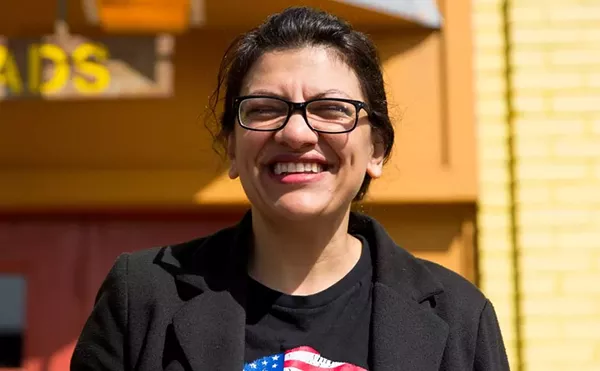
Dozens of blind and visually impaired Detroiters and their allies packed into a conference room on the city’s west side on Saturday to tell a representative from the Department of Justice harrowing stories about their experiences using Detroit’s paratransit services.
The hours of testimony included anecdotes of chronically late drivers who left blind riders out in the cold or dropped them off at the wrong location. One resident even recounted a story in which a driver failed to properly secure a rider’s wheelchair, a danger to their safety.
The riders, which included members of the National Federation of the Blind (NFB) Detroit chapter and the advocacy group Warriors on Wheels, also said they felt like city officials ignored their concerns for years. The problems were so bad that a number of residents said they refused to use the service, and instead relied on friends and family, or ride-sharing apps like Uber or Lyft.
The meeting was called after a tumultuous week in which Detroit City Council, citing resident complaints, opted not to renew the city’s five-year contract with Transdev, a French-based company that was hired to provide transportation services for the city’s disabled residents. At the 11th hour, Councilwoman Gabriela Santiago-Romero changed her vote to “no,” terminating the contract.
“And that’s basically when all hell broke loose,” said Lisa Franklin of Warriors on Wheels.
After the vote, Transdev issued a recorded message to its riders saying service would be drastically cut. The Federal Transit Administration then sent a letter threatening that the Detroit Department of Transportation could lose funding unless it restored services immediately, leading an irate Mayor Mike Duggan to blast City Council for being “dysfunctional” and use public emergency powers to line up temporary contracts with four other providers for six months as the city looks for a new provider.
But the riders disputed Duggan’s characterization that Detroit City Council was “dysfunctional,” and praised “brave” members like Santiago-Romero for listening to their concerns.
“I want to say absolutely explicitly that when the mayor ran in — like a white knight on a horse with his emergency powers to solve this terrible crisis that he wouldn’t permit to continue — what he failed to tell the city was that he created that crisis,” said Steven Handschu of the NFB Detroit chapter. “So let’s just understand that that was all political theater.”
“He blames the City Council, but there’s one person who had the power to stop all this weeks and weeks and weeks ago, months ago, and who didn’t,” said Richard Clay, a board member of the National Federation of the Blind Detroit chapter. “And that was him.”
He added, “How in the world does a major city get to this point? It doesn’t just happen in a vacuum.”
The riders said issues with Detroit’s paratransit services dated back decades to Transdev’s predecessor Veolia Transportation, which provided the services starting in 1999 until it ended its contract in 2009, citing an unpaid bill of $5.4 million.
Clay said in recent years, the NFB presented the city with 15 suggestions for improvements, including a call for same-day service, better training for drivers, and an independent body to monitor and evaluate Transdev. He admitted that they saw improvements on about half of the complaints, but many were reversed amid the COVID-19 pandemic.
The riders said that the unreliable service caused them to miss work shifts, doctor’s appointments, and classes.
One resident said she canceled attending a Christmas party she was invited to because of the shoddy service.
“This is at the point where I dread going anywhere,” she said. “It’s the concern about whether I’m gonna get picked up.”
That was echoed by attorney Jill Babcock, who said Transdev’s chronic tardiness caused her to miss meetings for her job with the City of Detroit and even once left her stranded in the cold rain.
“So after that instance, I don’t use paratransit,” she said. “I rely on my sister. If she can’t take me, I don’t go.”
To drive the point home, one attendee revealed that her ride to pick her up from the meeting had arrived nearly an hour before the scheduled window. She was forced to leave early.
NFB Detroit chapter president Sabrina Simmons said her experiences using better paratransit services in other cities led her to fight for better service in the Motor City.
“If it can happen in another city, it can happen in Detroit,” she said.
Michael El-Zain, an assistant U.S. attorney in the Eastern District of Michigan and member of its civil rights unit, encouraged the riders to continue to talk with him beyond the meeting as the DOJ continues its investigation. Members of the NFB also encouraged riders to continue to document and file their complaints to the city and Transdev.
Clay said he felt the blind riders were being treated differently by the city and ignored.
“Some of us don’t see with our eyes, but we see very clearly what’s going on,” he said.
Coming soon: Metro Times Daily newsletter. We’ll send you a handful of interesting Detroit stories every morning. Subscribe now to not miss a thing.
Follow us: Google News | NewsBreak | Reddit | Instagram | Facebook | Twitter







